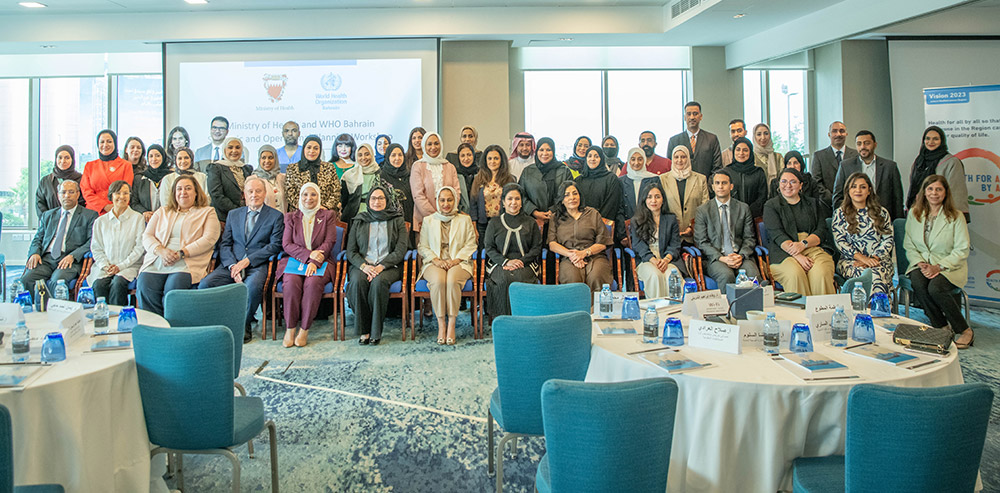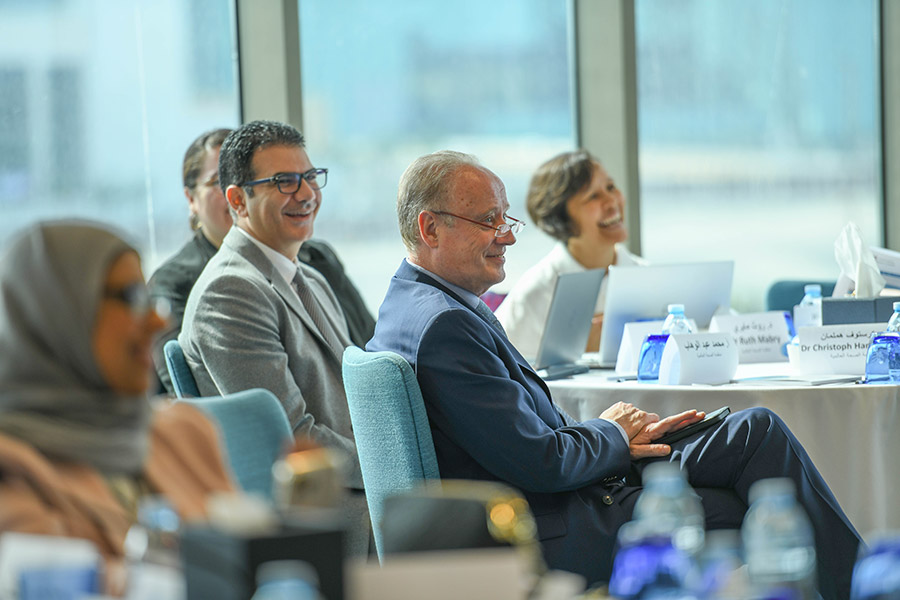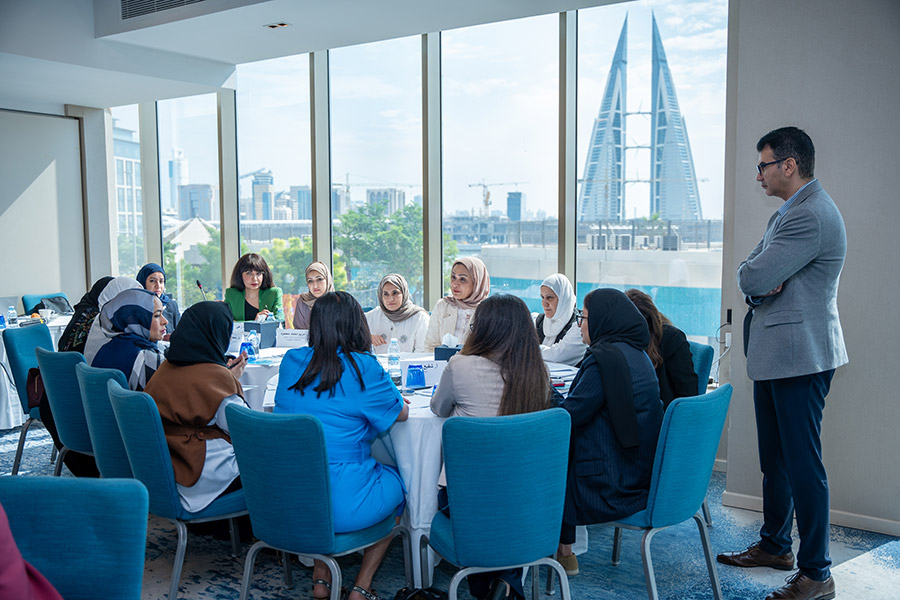 Over 45 technical staff from the Ministry of Health, including focal points for universal health coverage, nutrition, noncommunicable diseases, mental health, road safety, maternal and child health, and health emergencies, took part in the Strategic and Operational Planning Workshop. Photo credit: WHO/WHO Bahrain
Over 45 technical staff from the Ministry of Health, including focal points for universal health coverage, nutrition, noncommunicable diseases, mental health, road safety, maternal and child health, and health emergencies, took part in the Strategic and Operational Planning Workshop. Photo credit: WHO/WHO Bahrain
2 January 2024, Manama, Bahrain – A workshop held in late 2023 sparked a healthy dialogue on WHO’s cooperation with Bahrain, helping to identify core focus areas for WHO collaboration over the next 2 years. Efforts in these areas will seek to promote, maintain, recover, and improve the health of all people, in line with the Government Plan 2023–2026.
 Regional Office experts facilitated the event, including Dr Christoph Hamelmann, Chef de Cabinet; Ms Samah Abdelaziz, Governing Bodies Officer; Dr Ruth Mabry, Global Health consultant; Dr Mohammed Abdel Wahab, Technical Assistant; and Ms Micaela Pereira, Technical Officer. Photo credit: WHO/WHO BahrainThe WHO Country Office in Bahrain organized the 2-day Strategic and Operational Planning Workshop on 15–16 November 2023, in close collaboration with the Ministry of Health. Her Excellency Dr Ejlal Al-Alawi, former Assistant Undersecretary for Public Health, and Dr Tasnim Atatrah, WHO Representative in Bahrain, launched the workshop.
Regional Office experts facilitated the event, including Dr Christoph Hamelmann, Chef de Cabinet; Ms Samah Abdelaziz, Governing Bodies Officer; Dr Ruth Mabry, Global Health consultant; Dr Mohammed Abdel Wahab, Technical Assistant; and Ms Micaela Pereira, Technical Officer. Photo credit: WHO/WHO BahrainThe WHO Country Office in Bahrain organized the 2-day Strategic and Operational Planning Workshop on 15–16 November 2023, in close collaboration with the Ministry of Health. Her Excellency Dr Ejlal Al-Alawi, former Assistant Undersecretary for Public Health, and Dr Tasnim Atatrah, WHO Representative in Bahrain, launched the workshop.
“As we mark the 75th anniversary of the founding of WHO, we must be proud of the remarkable partnership between the Organization and Bahrain. This partnership is long-standing and has deepened over time, as evidenced by the establishment of the WHO Country Office in Bahrain in 2021,” said Dr Atatrah.
“Fundamental to the Country Office’s work in and with Bahrain is how we align our operations with identified national needs and priorities towards achieving the Sustainable Development Goals and WHO’s Triple Billion targets,” she continued.
More than 45 technical staff from the Ministry of Health took part in the workshop, addressing WHO strategic priorities such as universal health coverage, health emergencies, and better health and well-being. Experts from the WHO Regional Office for the Eastern Mediterranean and WHO Bahrain facilitated the event.
Dr Christoph Hamelmann, Chef de Cabinet at the Regional Office, stressed the importance of having spaces, such as the workshop, in which governments and WHO can engage in strategic and operational discussions. This will ensure that WHO provides valuable cooperation to its host countries. “WHO is a membership organization,” said Dr Hamelmann. “It is the Member States that are WHO, and they are the ones who give the guidance.”
 Group discussions identified key priorities for WHO support over the next 2 years, including health promotion, universal health coverage, and emergency preparedness and response. Photo credit: WHO/WHO BahrainOver 2 days, the workshop introduced participants to WHO’s role and mandate as the lead technical agency of the United Nations responsible for public health and provided insights into its governing bodies at the global and regional levels. It also explored the Organization’s key areas of work to guide WHO Bahrain’s operations in and with Bahrain.
Group discussions identified key priorities for WHO support over the next 2 years, including health promotion, universal health coverage, and emergency preparedness and response. Photo credit: WHO/WHO BahrainOver 2 days, the workshop introduced participants to WHO’s role and mandate as the lead technical agency of the United Nations responsible for public health and provided insights into its governing bodies at the global and regional levels. It also explored the Organization’s key areas of work to guide WHO Bahrain’s operations in and with Bahrain.
Invaluable insights from group work discussions helped to identify priorities for WHO support for the next 2 years. These are to:
promote health through transformative action on climate change and the social determinants of health;
provide health by expanding coverage of essential health services to achieve universal health coverage;
protect health by taking action to strengthen health emergency prevention, preparedness, response, and resilience;
reinforce the use of evidence and translate innovations into interventions and national decision-making; and
strengthen health diplomacy, collaboration, and partnership, as well as advocacy and strategic communications.
The group work discussions were also a chance to reflect on the Ministry of Health–WHO joint work plan activities for 2022–2023 and agree on actionable recommendations to improve performance. These will be incorporated into the joint work plan for 2024–2025.
As such, the workshop served as a practical starting point for preparing this latest joint work plan, which focuses on achieving the Sustainable Development Goals agenda and the Triple Billion targets.








